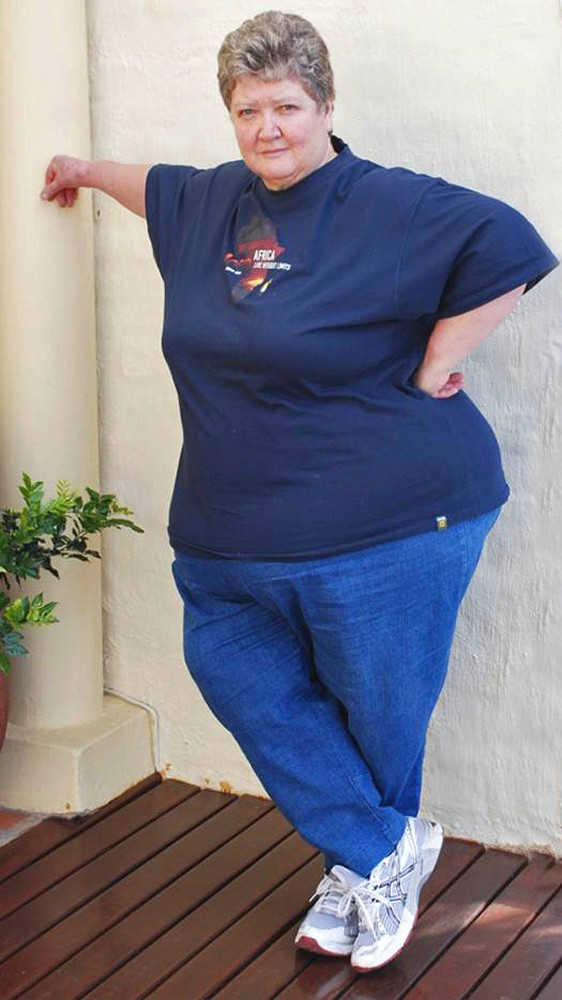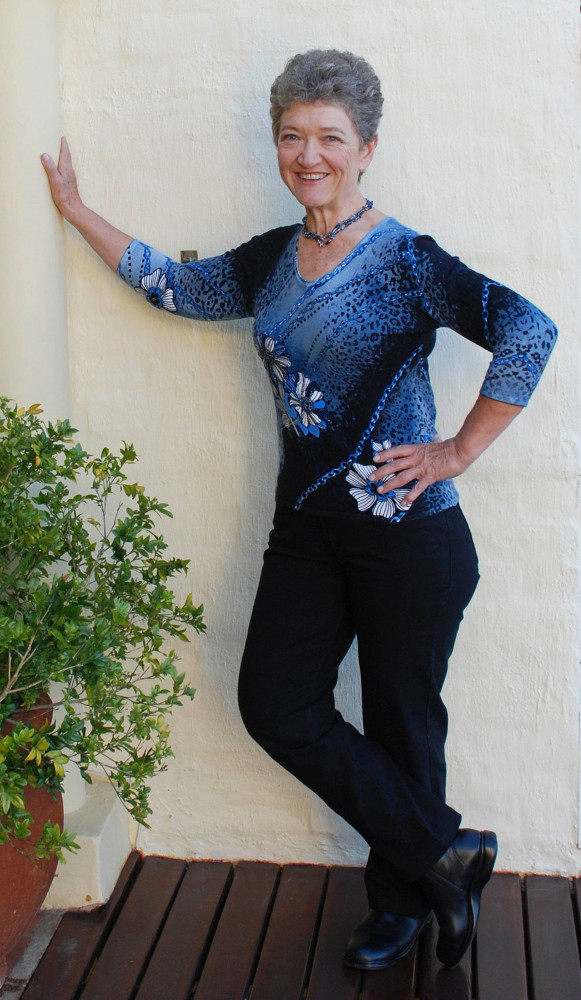Santie Pretorius lost more than 100kg after undergoing bariatric surgery
Santie Pretorius was morbidly obese, in constant pain, prediabetic and severely depressed. Gastric bypass surgery, a radical intervention not without risks, seemed her only option. Though sceptical when she first heard about the procedure, she opted for it and it changed her life. Her book, Fat Genes to Skinny Jeans, reveals her almost four-decade personal struggle with obesity and how bariatric surgery took her from 175kg to just over 70kg. This is a condensed, edited extract from her book.
Journal: June 10 2011
For 40 years I have tried diets, exercise, books, psychotherapy, new interests and hobbies, eschewing diets, learning to “eat right for life”, food logging, journalling, more books, web-based programmes. And where did it get me? Hating myself. Now what is left is failure and despair. I can see no way out, I can see no way forward for me in this life. I have reached the end of the road.
Journal: March 7 2014
I weighed 175kg and should weigh 68kg. I was 106kg overweight.
- If I lost 65% of my excess weight, I would weigh 106kg.
- If I lost 75% of my excess weight, I would weigh 95kg.
- To move from the obese category to being merely overweight, I would have to reach 78kg.
These targets seemed downright ridiculous to me. I was never going to break through to double digits in kilograms, not in this lifetime. It was scary. What if I failed to get to even the first target, 120kg? What if I’m disappointed?
The outcome was to refuse to set a target. My goal would not be a number. My goal would be to follow the guidelines I’d been given by my team, my books and my research, and to let happen what would happen.
So I was off, following the rules, not drinking after meals, stopping when I felt full, exercising frequently and consistently, and so forth. One morning, a mere four months after my weight loss surgery, I woke my partner Viv. “I’ve just been on the scale. I’m back to where I was when we went to South America 20 years ago. I weigh 120 kilograms.”
And the weight kept dropping. Below 113 kg. And still dropping. More slowly now, but still dropping. I had developed a taste for healthy living, actively and consciously searching for the most nutritious food on the menu, and getting quite grumpy if, for some practical reason, I’d miss exercising for more than two days in a row.
My body was beginning to tell me what it needed and I was beginning to listen.
Eight months after surgery, I walked into one of my favourite coffee shops, Île de Païn, and told owner Liezie Mulder: “I’ve broken through the 100 kilograms barrier. My weight is in double digits now, I weigh 98 kilograms.”
And the weight continued to come off. Below 95kg. And still dropping. Slowly, slowly now, like a racing car finally being manoeuvred into a narrow parking bay.
Journal: July 3 2014
Bariatric surgery, I believe, is a way to cheat the genes. It levels the playing field. Not only do I now have a tiny pouch instead of a large stomach, which means I can eat only small quantities at a time, but the dramatic changes that have taken place hormonally have a profound effect on my relationship with food.
The surgery has made it possible for me, finally, to understand what other people mean when they talk about “eating until you’re satisfied” and “stopping before you’re full”. I now know the experience of satiety, and it has become my great friend.
A renowned bariatric surgeon, Dr Laytham Flanagan, said: “We have come to understand that the accomplishment of satiety, or suppression of hunger, is fundamental to the success or failure of bariatric operations.”
That has become a mantra to me. What it means is that I will succeed, long-term, if I use this pouch, this tool that I have been given, to obtain the feeling of satiety that is so necessary in controlling my food intake.
Since my surgery, I am finding it possible, although it is still a challenge, to follow guidelines like:
- Stop before you’re full.
- Don’t drink when you eat or directly after you’ve eaten.
- Don’t snack in between meals.
I knew about these guidelines before surgery: the craving to overeat and snack on fattening foods, driven by my genes, was simply too strong. Now, I reckon my craving is not very different from the way other people experience it and, with a bit of willpower, I can control it.
Every now and then I get a visit from the old craving devil. Sweets, chocolates and cookies smile at me seductively from shelves in shops. And then I tell myself: “I’m not that kind of person anymore. I don’t buy on impulse, and I don’t eat in response to cravings.” I do allow myself a small treat, very occasionally, but never on impulse, and never when I crave it. And that’s the story of cheating the genes.
Journal: July 8 2014
A friend showed before-and-after pictures of me to a doctor in Knysna who had treated me – unsuccessfully – for a persistent asthmatic cough that plagued my obese years, and told him I had had bariatric surgery.
“It doesn’t work,” said he, looking at the picture of transformation. “They all have digestive problems …”
That comment explains to me why, incredibly, during the 40 years that I struggled with obesity, no doctor ever mentioned bariatric surgery as an option.
Of course, this doctor did have a sort of a point. People who have had the gastric bypass procedure do have a compromised digestive system.
For me, that means that I have to take care: I have to chew well, and take a daily dose of fibre powder, probiotics, vitamins and nutritional supplements.
I also have to have blood tests analysed by my endocrinologist once a year for the rest of my life, to ensure that I have no nutritional deficiencies.
All that seems to me a much better deal than the health problems I had to cope with three years ago.
My health problems saw me consulting many doctors and specialists. Although my asthma was under control with medication, I could not shake a really bad cough – a cough that had embarrassed me on many social and business occasions.
My blood pressure was too high, I was prediabetic, sleeping badly because of sleep apnoea, and I visited a physiotherapist or chiropractor at least four times a month. I was on crutches for 18 months before my surgery.
I could not carry out a normal gym routine – I had to exercise in the pool. I took four to five medically prescribed drugs on a permanent basis, and numerous vitamins and supplements. And I was deeply depressed.
It is not my place to recommend bariatric surgery to anyone – or to advise against it. But I do believe doctors have a duty to inform their patients about the option of bariatric surgery. After that, it’s up to you to make your own decision, and find your own way.
My story is not a how-to manual. It is simply my story.
Santie Pretorius is a clinical psychologist, management development consultant and motivational speaker based in Knysna. Fat Genes to Skinny Jeans is published by Amazon


The risks of bariatric surgery
Bariatric surgery has helped some people to lose huge amounts of weight and to live healthier lives, but the procedure is mired in controversy, especially in South Africa.
According to the United States medical research organisation Mayo Clinic, there are five main types of bariatric surgery. Only extremely obese people, who also often have serious health problems such as diabetes or high blood pressure, should consider it as an option.
Some procedures are less risky, such as the “gastric band” option, which is an inflatable band that restricts the size of the stomach. Others involve the stapling or removal of parts of the stomach and intestines.
In 2009 the investigative television programme Carte Blanche reported that local doctors who weren’t qualified to perform this surgery were operating on people, leaving some women badly scarred. The show reported that some general practitioners were carrying out these procedures and one doctor admitted he’d had only one week’s training instead of the required four years.
The Health Professions Council of South Africa (HPCSA) later announced that only doctors with specialist qualifications in bariatric or cosmetic surgery could perform these operations.
In 2010 a Pretoria-based surgeon was found guilty by the HPCSA on two charges of unprofessional conduct for performing a jejunoileal bypass, a controversial type of bariatric surgery, on his patients, who suffered complications. He was sentenced to a three-month suspension from practising medicine, which was deferred for a year. The HPCSA has since banned jejunoileal bypass surgery (which removes the majority of the small intestine) because it was associated with liver and kidney failure.
Bariatric surgery is risky in general, especially if people fail to follow very specific guidelines that include restricting food intake, not eating certain foods and taking nutritional supplements.
According to Mayo Clinic, possible complications after surgery could include stomach perforation, bowel obstruction, gallstones, hernias, low blood sugar, malnutrition, ulcers, vomiting and, in very rare cases, even death.
After surgery a strict diet must be followed. It begins with a liquids-only stage, followed by a soft foods period and finally regular food – but in much smaller quantities than before the surgery. Mayo Clinic also warns about the side effects of rapid weight loss after surgery, which can include hair loss, body aches, dry skin, mood changes, feeling tired and feeling as if you have flu. – Amy Green